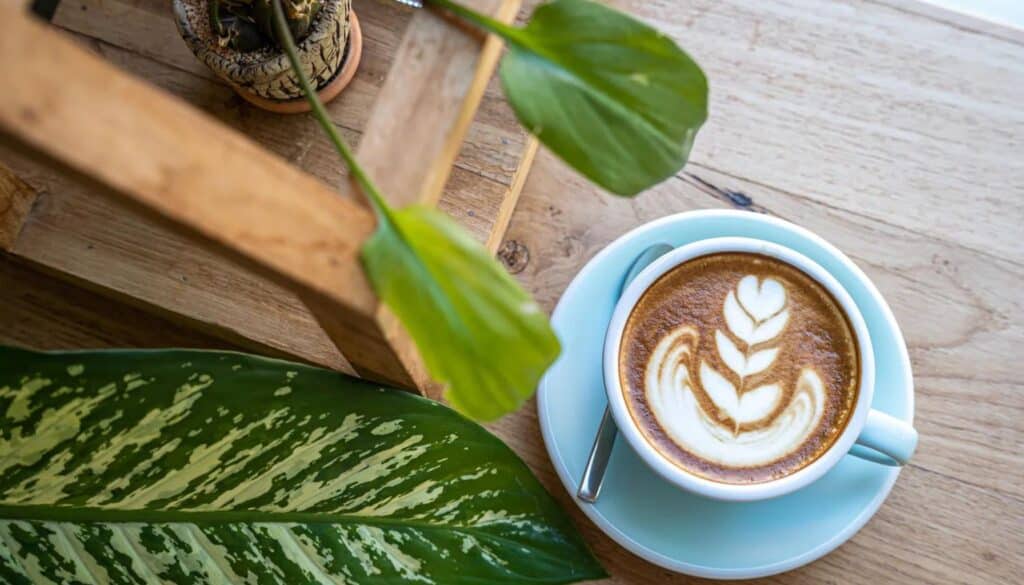Veganism isn’t just about choosing certain foods; it’s about living a life that tries its best to avoid using or hurting animals for food, clothes, or anything else. Vegans aim to eat plant-based foods and stay away from animal products like meat, dairy, eggs, and honey. They make this choice because they care about animals, their own health, and the planet. This way of living asks people to think carefully about what they eat and drink, including where it comes from and how it’s made.
Now, let’s talk about coffee, something many of us drink every day. Coffee comes from the roasted seeds of the Coffea plant, and it seems like it should be vegan. But, figuring out if coffee is vegan isn’t as simple as it seems.
In this article, we’re going to take a close look at how coffee is made, from the bean to your cup. We’ll see if any part of making coffee uses animal products or if there are any issues with how coffee is grown that might not fit with vegan values. We’ll also give tips on how to make sure your coffee is vegan. So, if you’re a vegan and wondering about your morning cup of coffee, you’re in the right place. Let’s find out together if coffee is a good choice for vegans.
Is Coffee Vegan?
Yes, coffee itself is vegan, as it is a plant-based product derived from the coffee bean. However, when considering whether a coffee beverage is vegan, it’s essential to look at the other ingredients added to it. For instance, traditional dairy products like milk or cream are not vegan, but there are many plant-based milk alternatives available for those seeking a vegan option, such as almond milk, soy milk, oat milk, and coconut milk.
Is Coffee Vegan? The Simple Answer

Basic Coffee Composition and Its Alignment with Veganism
Coffee is naturally vegan right from the start. We make it from the roasted seeds of the Coffea plant, which most people know as coffee beans. People pick these beans, process them, and roast them to make the delicious, rich drink that millions of us love to drink every day. Because coffee comes from plants, it fits perfectly with the vegan goal of not using animal products. Just mixing water and coffee beans keeps coffee vegan-friendly, so it’s a great drink for anyone living a vegan life.
Types of Coffee Beans and Their Harvesting Processes
Coffee beans come in several varieties, primarily Arabica and Robusta, each with unique flavors, caffeine content, and growth conditions. Arabica beans are known for their sweet, complex flavor profiles and are predominantly grown in Latin America, while Robusta beans, which have a stronger, more bitter taste, are primarily cultivated in Africa and Indonesia.
- Arabica Beans: These beans are typically grown at higher altitudes, requiring more attention and care. They are prized for their mild and aromatic flavors and make up about 60-70% of the world’s coffee production.
- Robusta Beans: Grown at lower altitudes, Robusta beans are more resistant to pests and harsh conditions, leading to a more straightforward cultivation process. They are often used in espresso blends for their strong flavor and rich crema.
The harvesting process of coffee beans is also relevant to their vegan status. There are two primary methods of coffee bean harvesting:
- Hand Picking: Workers manually pick only the ripe cherries from the coffee plant. This labor-intensive method is more common in regions where Arabica beans are grown and ensures a higher quality of coffee.
- Strip Picking and Mechanical Harvesting: This method involves removing all cherries from a branch at once or using machines to harvest all cherries simultaneously, regardless of ripeness. It’s more efficient but can lead to a mix of ripe and unripe beans, affecting the coffee’s quality.
Both harvesting methods are vegan in practice, as they do not inherently involve animal products or by-products. However, the choice between these methods can have implications for the quality of the coffee and, by extension, its impact on the environment and the laborers involved. While the harvesting process itself aligns with vegan principles, the broader ethical considerations surrounding coffee production, such as labor practices and environmental sustainability, are also of interest to many in the vegan community.
Beyond the Bean: When Coffee Might Not Be Vegan

Even though plain coffee fits well with being vegan, adding things like flavors, milk, or certain sugars can change that. Let’s break down how these things can affect whether your coffee stays vegan.
Adding Flavors to Coffee
People love flavored coffees because they offer so many different tastes. You can get these flavors from syrups, spices, or chemicals that taste like certain things. Many of these flavorings come from plants or are made in a lab, so they’re vegan. But, watch out! Some flavored coffees might have ingredients from animals, like honey or milk stuff in their syrups. If you’re vegan, it’s a good idea to check what’s in your flavored coffee to make sure it sticks to vegan rules.
Milk and Creamers in Your Coffee
Lots of people like adding milk or creamer to their coffee, but this can make your coffee not vegan if it’s from animals. The good news is there are lots of vegan options out there, like almond, soy, oat, and coconut milk. These plant-based choices can make your coffee creamy and tasty without animal products. Just make sure the milk or creamer you use is made from plants to keep your coffee vegan.
What About Sugar?
Sugar makes coffee sweet, but how it’s made can be a problem for vegans. Some sugar from sugarcane uses bone char, which comes from animal bones, to make it white. This means not all sugar is vegan. But don’t worry, you can find vegan sugar that doesn’t use bone char, or you can sweeten your coffee with other vegan-friendly sweeteners like agave syrup, maple syrup, or stevia.
To sum it up, coffee itself is vegan, but adding certain flavors, milk, creamers, or sugars can introduce non-vegan elements. If you’re vegan, paying attention to these details helps make sure your coffee matches your vegan lifestyle.
Ethical Considerations in Coffee Production

The way we think about coffee isn’t just about whether it’s vegan. It also involves thinking about the environment, how people are treated, and the well-being of animals. Many vegans care about these issues too, because they want to eat in a way that’s kind to the planet, fair to workers, and doesn’t harm animals.
How Coffee Farming Affects the Environment
Growing coffee can really change the environment. Turning forests into coffee farms means we lose trees, animals lose their homes, and we see fewer types of plants and animals. These changes are bad for the planet and even make climate change worse because we have fewer trees to soak up carbon dioxide. Also, using lots of chemicals to grow coffee can harm our water and soil.
But, there’s a brighter side! Some coffee farmers grow their coffee under the shade of big trees, which helps keep all kinds of plants and animals safe and cuts down on the need for harmful chemicals. Organic coffee farming skips the synthetic stuff altogether, which is much better for the earth.
What’s Going on with Workers in the Coffee World
Unfortunately, the coffee industry has some big problems with how it treats workers. Many times, coffee farmers get paid very little, work in bad conditions, and there can even be child labor. This keeps farmers poor and hurts their communities.
Fair Trade coffee is one way to fix this. It makes sure farmers get a fair price for their coffee, which helps them live better lives and farm in ways that are good for the earth. When you buy Fair Trade coffee, you’re helping make sure everyone involved is treated right.
Coffee Farms and Wild Animals
When new coffee farms pop up, it often means destroying places where animals live. This is especially tough in parts of the world that have lots of unique animals and plants. But, some coffee is grown in ways that help animals keep their homes. Coffee with a “shade-grown” or “bird-friendly” label means that the coffee is grown in a way that’s better for animals. These farms give animals places to live, even when other farms are taking over their homes.
For people who care about being vegan and making ethical choices, it’s important to think about all of these issues when they choose their coffee. Picking coffee that’s good for animals, people, and the planet means supporting a world that matches vegan values of kindness, fairness, and taking care of the earth.
Vegan-Friendly Coffee Options

For those adhering to a vegan lifestyle, navigating the world of coffee requires some attention to detail to ensure that their beverage remains free from animal products. Fortunately, with the growing awareness and popularity of veganism, there are plenty of vegan-friendly coffee options available, from the coffee itself to the additives that enhance its flavor and texture.
How to Ensure Your Coffee is Vegan
- Choose Plain Black Coffee: The simplest way to ensure your coffee is vegan is to opt for plain black coffee without any additives. Most black coffee, whether brewed at home or ordered in a café, is inherently vegan, made only from water and coffee beans.
- Read Labels Carefully: For flavored coffees or those with added ingredients, it’s important to read labels for any hidden animal-derived products such as honey or milk derivatives.
- Inquire About Processing: When possible, ask about or research how the coffee is processed, particularly if bone char is used in the sugar or if there are any non-vegan additives in flavored coffees.
- Look for Certifications: Vegan certifications can help identify products that are free from animal derivatives, including some coffees and coffee additives.
Recommendations for Vegan Milk and Creamers
The market for vegan milk and creamers has expanded significantly, offering a variety of options that cater to different tastes and preferences:
- Almond Milk: Known for its light texture and slightly nutty flavor, almond milk is a popular choice for adding to coffee.
- Soy Milk: Soy milk offers a creamy texture similar to dairy milk, making it a favorite for lattes and cappuccinos.
- Oat Milk: Oat milk is celebrated for its smooth texture and natural sweetness, enhancing coffee without the need for additional sweeteners.
- Coconut Milk: With its rich texture and tropical flavor, coconut milk adds a unique twist to coffee drinks.
- Cashew and Other Nut Milks: These provide additional options for those looking for different flavors or nutritional profiles.
Many brands now offer barista versions of these plant milks, specifically formulated to foam and blend well with coffee, making them ideal for espresso drinks.
Popular Brands Offering Vegan Coffee Products
Several brands have gained popularity for their commitment to producing vegan-friendly coffee products, including:
- Califia Farms: Known for their almond and oat milk creamers specifically designed for coffee.
- Oatly: Offers a range of oat milks, including barista editions that foam beautifully for lattes and cappuccinos.
- Silk: Provides a wide variety of plant-based milk and creamers, including soy, almond, and oat options.
- Stumptown Coffee Roasters: Offers high-quality coffee beans and ready-to-drink cold brews that are vegan-friendly.
- Minor Figures: Specializes in oat milk and oat milk-based coffee products, including nitro cold brew cans.
By choosing vegan-friendly coffee options and being mindful of the additives and processes involved in coffee production, vegans can enjoy their beloved beverage without compromising their ethical standards. With the availability of plant-based milks and creamers, as well as a growing number of coffee brands catering to vegan consumers, it’s easier than ever to maintain a vegan lifestyle while indulging in a delicious cup of coffee.
Making Vegan Coffee at Home

Creating delicious vegan coffee at home is an enjoyable and straightforward process, allowing for customization according to personal taste and ethical considerations. With the right ingredients and some creativity, you can enjoy a variety of vegan coffee drinks that rival those from your favorite café.
Tips for Brewing Your Own Vegan Coffee
- Start with Quality Coffee Beans: Choose high-quality, ethically sourced coffee beans to ensure your coffee not only tastes great but aligns with vegan principles regarding labor and environmental practices.
- Experiment with Plant-Based Milks: Different plant milks can dramatically change the flavor and texture of your coffee. Experiment with almond, soy, oat, and coconut milks to find your favorite. Consider using barista editions for frothy lattes and cappuccinos.
- Use a Good Coffee Maker: Whether you prefer a simple French press, a drip coffee maker, or an espresso machine, using a quality coffee maker can make a significant difference in the taste of your coffee.
- Heat Plant Milks Carefully: Some plant milks can curdle or separate if heated too quickly or too much. Heat gently and avoid boiling to maintain a smooth consistency.
Vegan-Friendly Sweeteners and Flavorings
- Agave Syrup: A great vegan alternative to honey, agave syrup is sweet and dissolves easily in both hot and cold beverages.
- Maple Syrup: Adds a rich, distinct flavor to your coffee while providing sweetness.
- Stevia: A calorie-free natural sweetener that’s much sweeter than sugar, so you’ll need to use less.
- Coconut Sugar: Offers a lower glycemic index than regular sugar and adds a slight caramel flavor.
- Vanilla Extract: A few drops can add a lovely aroma and flavor to your coffee without any added sugar.
- Cinnamon or Nutmeg: Spices can offer warmth and complexity to your coffee without sweetness if you prefer your coffee less sweet.
DIY Vegan Coffee Recipes
Vegan Latte
- Brew a strong cup of your favorite coffee.
- Heat and froth your choice of plant milk using a frother or by whisking vigorously.
- Combine the frothed milk with the coffee, adjusting the ratios to taste.
- Sweeten with agave syrup or maple syrup if desired.
Iced Vegan Mocha
- Mix a tablespoon of cocoa powder and your preferred vegan sweetener into a paste with a little hot water.
- Pour over ice, add cold brew coffee or chilled espresso, and top with cold plant milk.
- Stir well to combine and enjoy a refreshing mocha.
Vegan Caramel Macchiato
- Prepare a small cup of strong espresso.
- In a separate cup, mix a tablespoon of vegan caramel sauce with a little hot water to thin it out.
- Pour in heated and frothed plant milk, then gently add the espresso on top.
- Drizzle with a little more caramel sauce for an indulgent finish.
By incorporating these tips and recipes into your routine, making vegan coffee at home can be a delightful and satisfying part of your day, ensuring you don’t miss out on any of the flavors or experiences of traditional coffee culture.
Conclusion: Embracing Vegan Coffee Options
Wrapping up our journey into coffee and veganism, we’ve looked closely at how coffee, in its simplest form, really is vegan. But there’s more to think about than just the ingredients. We need to consider the impact on the environment, how people are treated in making coffee, and the ethics behind it all.
Recap of Key Points
- Coffee’s Vegan Status: At its core, coffee is a vegan-friendly beverage, derived from the roasted seeds of the Coffea plant. The basic preparation of black coffee aligns with vegan principles, avoiding animal products and by-products.
- Considerations Beyond the Bean: The addition of flavors, milk, creamers, and certain sugar processing methods can compromise coffee’s vegan status. Awareness and careful selection are required to maintain a vegan-friendly coffee experience.
- Ethical and Environmental Implications: The coffee industry’s impact on the environment, labor practices, and animal habitats necessitates thoughtful consideration. Choosing sustainably sourced, fair trade, and shade-grown coffee can help address these concerns.
- Vegan Coffee at Home: With a variety of plant-based milks, vegan sweeteners, and ethical coffee beans available, creating delicious vegan coffee at home is both achievable and rewarding.
Let’s Try Vegan Coffee Options
Choosing vegan coffee is about more than just following a diet. It’s about choosing to be kinder and more mindful in what we consume. With so many plant-based milks and responsibly made coffee available, enjoying a great cup of coffee doesn’t mean you have to give up on taste. Trying out different mixes and recipes lets you find the best flavors while doing good for the planet and animals.
Final Thoughts on Vegan Coffee
Living a vegan life with coffee is about more than food; it’s about caring for our world and all who live in it. As the coffee world grows, the choices we make can push for better practices and help protect our environment.
Whether you love a simple black coffee or a fancy vegan latte, every cup is a chance to show what you stand for and explore the wonderful world of coffee flavors. Let’s keep trying new things and sharing our love for vegan coffee, one cup at a time.
Frequently Asked Questions
1. Can vegans drink coffee? Yes, vegans can drink coffee. Plain black coffee is inherently vegan, being made from water and roasted coffee beans. The key is to be mindful of any added ingredients or processes that might not align with vegan principles.
2. What makes some coffee non-vegan? Coffee can become non-vegan due to the addition of animal-derived products such as milk, honey, or creamers. Additionally, some flavored coffees may contain ingredients or processing aids derived from animals, and sugar processed with bone char is also not considered vegan.
3. Are there vegan alternatives to traditional coffee creamers? Absolutely! There are many plant-based milk and creamer options available that are perfect for vegans. These include almond, soy, oat, and coconut milk, among others. Many brands also offer barista editions specifically designed to foam and blend well with coffee.
4. How can I ensure my coffee is ethically sourced? Look for coffee that is certified organic, fair trade, shade-grown, or bird-friendly. These certifications often indicate the coffee is grown using methods that are better for the environment, support fair labor practices, and protect animal habitats.
5. Can I make vegan flavored coffee at home? Yes, you can easily make vegan flavored coffee at home using a variety of plant-based syrups, spices, and sweeteners. Ingredients like vanilla extract, cinnamon, nutmeg, and vegan caramel or chocolate syrups can add delicious flavors to your coffee without any animal products.






